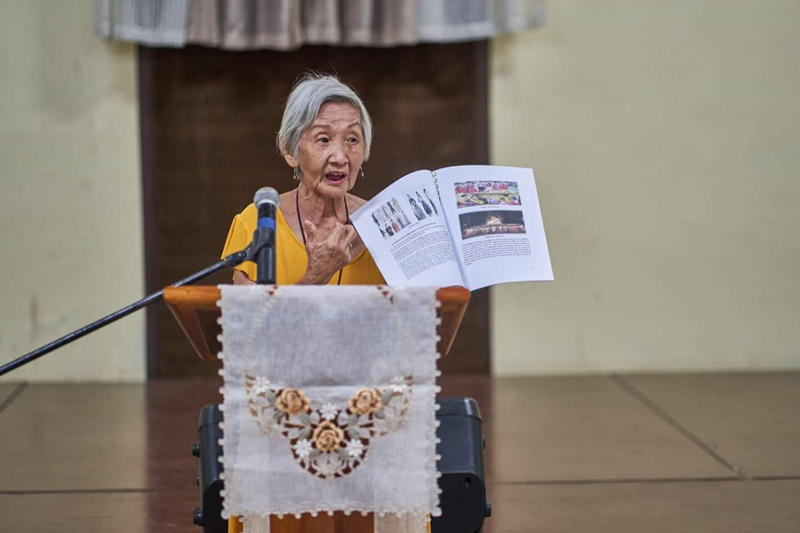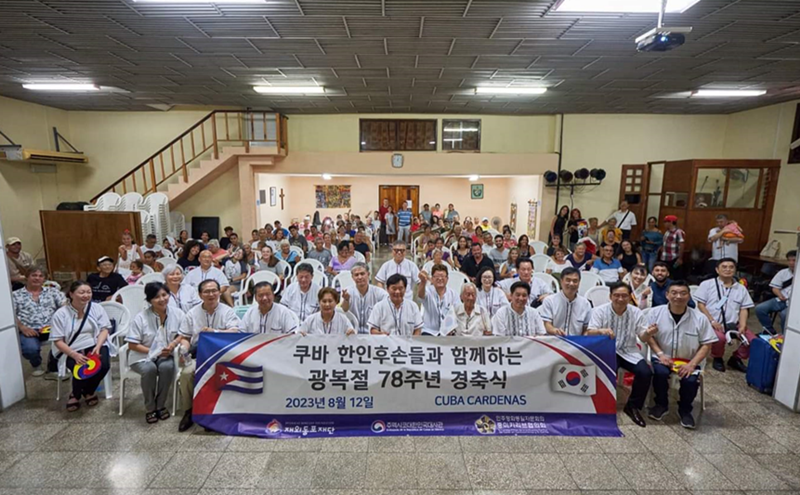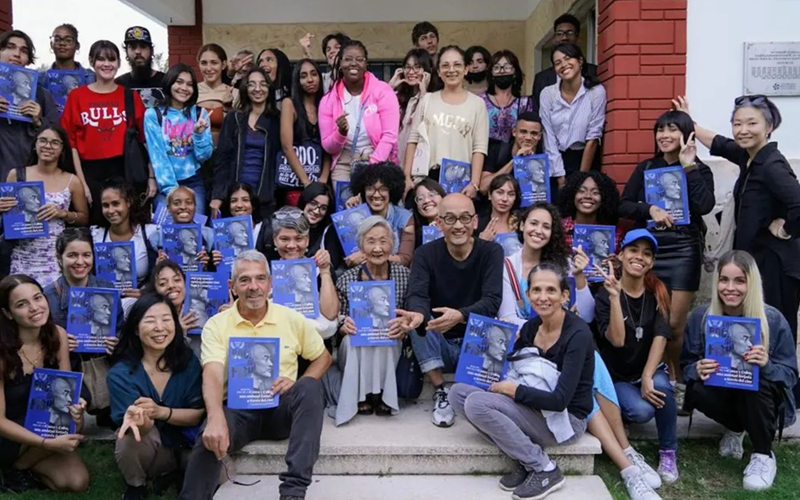
The descendants of the first Korean immigrants to Cuba on Aug. 12, 2023, held an event to celebrate the 78th anniversary of Korean independence from Japan at the Christian Center for Reflection and Dialogue in Cardenas, Cuba. Martha Lim Kim, the daughter of a Korean independence activist, is shown at the event talking about her book "Descendants of First Korean Immigrants to Cuba." (Alliance of Korean Descendants Mexico-Cuba)
By Hong Angie
"The establishment of diplomatic ties between Korea and Cuba was like a surprise gift. Koreans finally got their long-awaited dream of getting official diplomatic and consular relations."
Martha Lim Kim, a third-generation Korean Cuban, said this in a written interview on March 21 with Korea.net.
Having taught philosophy at the University of Matanzas for 33 years and led efforts to unite ethnic Koreans in Cuba, she said she was mostly influenced by her father Im Cheon-taek, an educator, Korean independence activist in Cuba and supporter of the Korean Provisional Government during Japanese colonial rule of the Korean Peninsula in the early 20th century.
Lim Kim has always been proud of her Korean heritage and her book "Koreans in Cuba" emphasizes the importance of Korean culture and history of immigration that she learned from her father. Her work is the only guide on Korean immigration to the island country from March 25, 1921, to the early 1950s before the Cuban Revolution.
She said, "The Feb. 14 agreement between Korea and Cuba on forming official diplomatic relations has fueled an atmosphere of optimism that the Cuban economy will improve."
Below are excerpts from the interview.
Briefly describe the background of Korean immigration to Cuba and the Korean association there.
Koreans who emigrated to work as agricultural workers in Mexico toward the end of the Joseon Dynasty (1392-1910) on March 25, 1921, arrived at the Cuban port of Manati. They swallowed their anger due to a ruined nation and moved all the way to the far-flung country of Cuba to work on sugarcane plantations.
As expected, they faced many difficulties from the early stage of their move. This was due to their lack of experience working on a sugarcane plantation. Worse, the fall of global sugar prices slashed wages. As a result, they had no choice but to work at henequen plantations, a job even lower-class Cubans avoided.
At the time, the Japanese consul in Cuba demanded that Korean immigrants there register as Japanese. In protest, Koreans on June 14, 1921, founded a Korean Cuban association at the El Bolo farm in Matanzas, something that also led them to conduct activities to support national education and the independence movement to establish their ethnic identity.
After Koreans in Cuba heard of the March First Independence Movement in their homeland, they founded the National Korean Association in 1923 and began full-fledged efforts to support the movement. On March 1 that year, they held a demonstration to declare Korean independence.
This led to the annual hosting of events and a street procession to commemorate the day. We wore Hanbok, ate leading foods from each region and shared our joys and sorrows. We also held traditional Korean weddings and birthday celebrations, something that was the major factor in continuing such traditions.

Martha Lim Kim; Antonio Kim Jam, president of the Association of Korean Descendants in Cuba; and Adelaida Jang, leader of a community of descendants of Korean immigrants in Cardenas and the head of the Peaceful Unification Advisory Council in Central America and the Caribbean, on Aug. 12, 2023, take a group photo with the teachers and students of Hangeul School at an event marking the 78th anniversary of Korea's National Liberation Day. (Alliance of Korean Descendants Mexico-Cuba)
None of the first generation of Korean immigrants remain in Cuba and the bonds between members of the ethnic Korean community centered on the National Korean Association have weakened. Ties between Korea and Cuba also grew distant due to the 1959 Cuban Revolution and the ensuing severance of bilateral ties, leading to the dilution of the ethnic identity of Korean Cubans. How many ethnic Koreans are in Cuba and what is their sense of cultural identity?
Cuba officially has 1,118 people of Korean descent. But the statistics differ based on increases in the number of births and deaths and immigration. The first generation refers to those who set foot on Mexican soil and the second to those born in Mexico. The descendants of Korean immigrants to Cuba are from the third to sixth generations. Among them, 33 were born to Korean parents and the rest to ethnic Koreans and Cubans.
Due to drastic changes in Cuban society in the 1950s, Korean families were separated and their community activities were restricted, thus a sense of Korean identity for many was weakened. But the launch of an ethnic Korean community in 1995 in Cuba helped reestablish our identity as Koreans. Today's younger generation is clearly aware of their identity and raising their love for their motherland and ancestors. Among the many factors behind recovering identity, youth exchanges of the Korean government play a crucial role.
What is the significance of Korea and Cuba forming official ties on Feb. 14?
The launch of bilateral ties was like a surprise gift. This was because the long-awaited dream of Korean Cubans to see diplomatic and consular relations finally came true after 65 years. This milestone is the starting point for expansion of exchange and cooperation in a range of fields including culture and economy. We will spread Korea's language and traditional culture to enhance friendship between Koreans and Cubans and boost ethnic pride in being descendants of Korean immigrants.
How have Cubans reacted to their nation and Korea forming bilateral ties?
The natives welcome and are excited over the news because they consider it an important step in improving Cuba's economic level.
Just like in other Central and South American countries, Cuba has seen Hallyu (Korean Wave) since the 2010s consistently spread. Interest in Korean culture that began with Korean pop, dramas and movies has massively and widely spread among the public.
Of course, the number of natives learning Korean has naturally grown in their process of discovering more about Korea beyond K-pop. I think they'll gain more opportunities by learning Korean and discussing their dreams of studying in Korea. Quite a few are also looking forward to direct flights between Korea and Cuba.

Director Lee Joon-ik's film "The Book of Fish" was invited to the Havana Film Festival, which ran from Dec. 8-17, 2023. Martha Lim Kim (center) and Lee take a group photo with the Cuban audience. (Honorary Reporter Dayviana Diaz)
Korean embassies and Korean Cultural Centers are the main promoters of Hallyu events abroad. Exposure to such content by Cubans used to be nearly impossible since Cuba had no ties with Korea. What do you expect of the Korean Embassy in Cuba as the Hallyu base in your nation?
The launch of diplomatic ties has given a much better foundation for the activities of Korea-loving communities. They are expected to get phased support for hosting Korean cultural events and gatherings and continuing to grow.
What should the Korean and Cuban governments do with their newly formed ties?
Korea and Cuba now have diplomatic ties but many obstacles remain. Demand for visits between both countries for purposes such as tourism and business must increase. Due to U.S. sanctions on Cuba, however, Koreans who have a record of visiting Cuba could face difficulty in going to the U.S. using an Electronic System for Travel Authorization without a visa. The Korean and Cuban governments must consider this to prepare practical measures and policies to expand bilateral cultural exchange and economic cooperation.
Another task is providing economic support to expand exchange and cooperation in non-political sectors such as culture, human exchange and development cooperation. For Korean Cubans to solidify their cultural identity, measures should include helping such people find their biological parents and relatives who were separated due to relocation or immigration.
shong9412@korea.kr